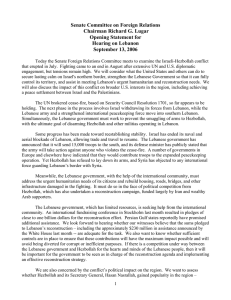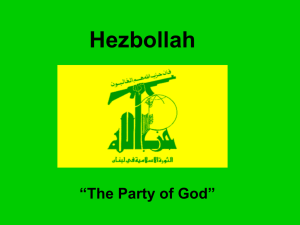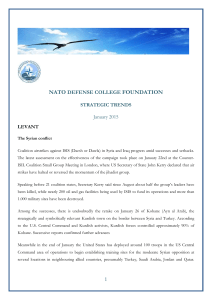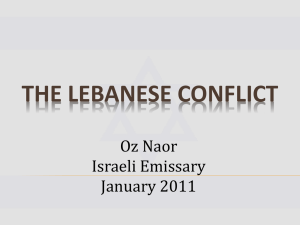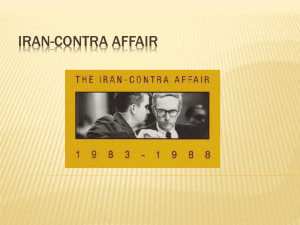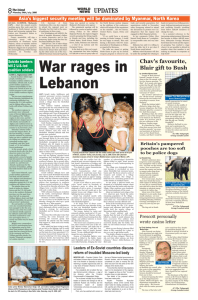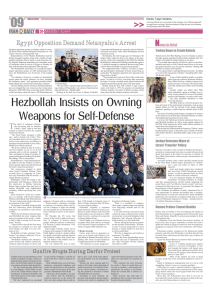LEBANON: SECURING A LASTING CEASE-FIRE
advertisement
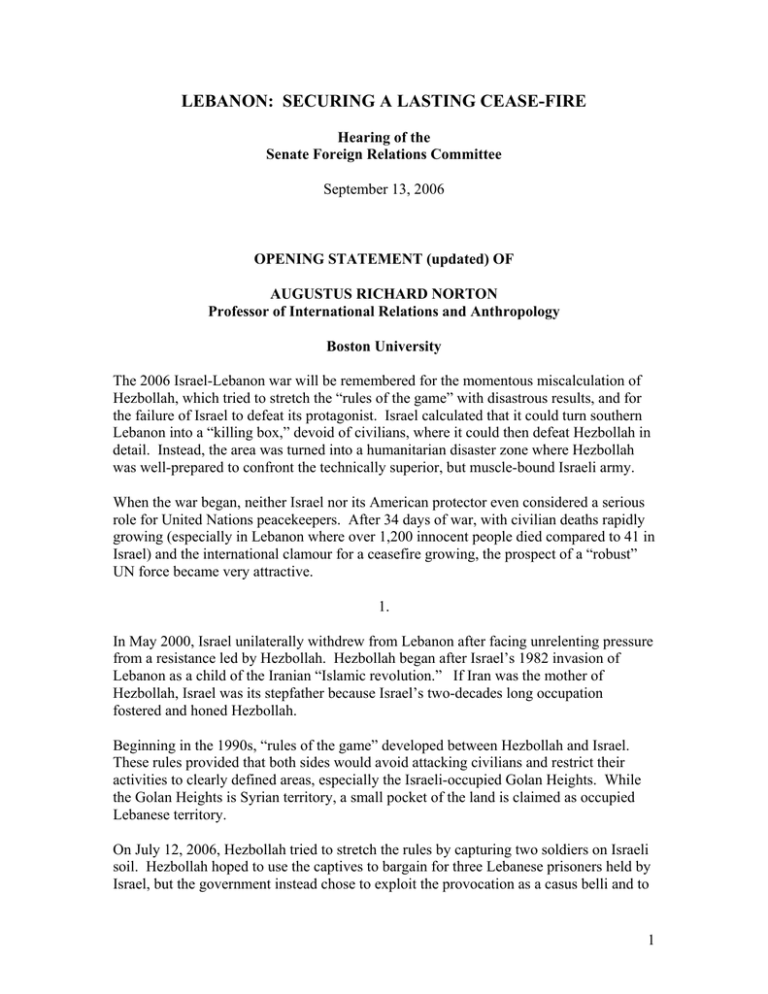
LEBANON: SECURING A LASTING CEASE-FIRE Hearing of the Senate Foreign Relations Committee September 13, 2006 OPENING STATEMENT (updated) OF AUGUSTUS RICHARD NORTON Professor of International Relations and Anthropology Boston University The 2006 Israel-Lebanon war will be remembered for the momentous miscalculation of Hezbollah, which tried to stretch the “rules of the game” with disastrous results, and for the failure of Israel to defeat its protagonist. Israel calculated that it could turn southern Lebanon into a “killing box,” devoid of civilians, where it could then defeat Hezbollah in detail. Instead, the area was turned into a humanitarian disaster zone where Hezbollah was well-prepared to confront the technically superior, but muscle-bound Israeli army. When the war began, neither Israel nor its American protector even considered a serious role for United Nations peacekeepers. After 34 days of war, with civilian deaths rapidly growing (especially in Lebanon where over 1,200 innocent people died compared to 41 in Israel) and the international clamour for a ceasefire growing, the prospect of a “robust” UN force became very attractive. 1. In May 2000, Israel unilaterally withdrew from Lebanon after facing unrelenting pressure from a resistance led by Hezbollah. Hezbollah began after Israel’s 1982 invasion of Lebanon as a child of the Iranian “Islamic revolution.” If Iran was the mother of Hezbollah, Israel was its stepfather because Israel’s two-decades long occupation fostered and honed Hezbollah. Beginning in the 1990s, “rules of the game” developed between Hezbollah and Israel. These rules provided that both sides would avoid attacking civilians and restrict their activities to clearly defined areas, especially the Israeli-occupied Golan Heights. While the Golan Heights is Syrian territory, a small pocket of the land is claimed as occupied Lebanese territory. On July 12, 2006, Hezbollah tried to stretch the rules by capturing two soldiers on Israeli soil. Hezbollah hoped to use the captives to bargain for three Lebanese prisoners held by Israel, but the government instead chose to exploit the provocation as a casus belli and to 1 launch a war to eliminate Hezbollah as an effective militia adversary of Israel. In point of fact, the Israeli army had been chomping at the bit for a chance to settle scores with Hezbollah, and both Israel and the U.S. relished the opportunity to devastate a powerful proxy of Iran. In the six year period that followed the end of the occupation, the Israeli-Lebanese border was quieter than it had been for the past thirty years. One Israeli civilian was killed by Hezbollah during this period, a victim of a falling anti-aircraft round fired at Israeli jets violating Lebanese air space. A total of 17 Israeli soldiers died, most either in Lebanon or on the Israeli-occupied Golan Heights. There were about ten incidents of Katyusha rockets fired across the border into Israel or into Israeli territorial waters. Almost all of the incidents were attributed by Israelis officials to Palestinian groups, not to Hezbollah. Thus, while the border was hardly tranquil, it was far calmer than even Israeli generals thought it would be when they left Lebanon in May 2000. Of course, it was Hezbollah’s error to presume that Israel was either satisfied with the status quo or sanguine about the impressive arsenal of rockets pointed towards Israel from Lebanon. 2. The United Nations Security Council resolution that won a ceasefire in the IsraelHezbollah war envisages the buttressing of the existing peacekeeping force in southern Lebanon. The United Nations Interim Force in Lebanon (UNIFIL) had been allowed (indeed, actively encouraged by the U.S.) to dwindle to a skeleton force of 2,000 peacekeepers, but resolution 1701 provides for a dramatic expansion of the force to as many as 15,000 troops. Contingents have been offered by Malaysia, Bangladesh and Indonesia , all nations that refuse diplomatic relations with Israel, but the core intent of resolution is to bolster UNIFIL with significant European force contributions. One of the telling successes of Hezbollah is that it has acquired such a fierce reputation for its tough toe-to-toe battles with Israel in this summer’s war that no sentient prime minister wished to send soldiers to do what Israel demonstrated it could not do. Even Turkish generals, whose army is no pushover, indicated that they were not enthusiastic about sending fighting units to Lebanon. France initially balked at sending a sizable contingent to Lebanon, and resolution 1701 seemed to be in jeopardy. However, after two weeks of careful discussions, mostly focused on the rules of engagement that define UNIFIL’s behaviour, France, Italy and Spain stepped forward as major contributors. France will lead the force until the present French commanding general’s assignment ends in early 2007, and command of the force will then pass to Italy. 3. UNIFIL was first deployed in 1978. Its original mandate, largely crafted by the U.S., was to oversee the withdrawal of Israeli forces from Lebanon. Unlike today, when Hezbollah 2 is seen as the culprit in Washington, President Jimmy Carter viewed Israel's 1978 invasion of Lebanon as an excessive and aggressive response to terrorism. The area of operations for UNIFIL remains much the same today, namely Lebanon south of the Litani river. When it first deployed, UNIFIL instantly found itself faced with uncooperative belligerents. Palestinian militants, who then controlled much of southern Lebanon, insisted on maintaining positions in two large sectors, including one right in the middle of the UNIFIL zone. Israel, too, undermined UNIFIL by refusing to allow it to fully deploy. In 1978, Israel handed control of a border enclave to a gang of Lebanese Army deserters. Israel dismissed UN protests pretending that it had no control over the "South Lebanon Army" of Major Sa’ad Haddad, which it paid, trained and directed. In contrast to the Palestinian militants, who were an alien force disliked by many people in southern Lebanon, Hezbollah draws much of its membership from the local population. The Shiite party boasts strong local support in the region, as the Israelis discovered to their cost during their long occupation from 1982-2000. 4. After more than a month of bombardment, Hezbollah emerged with its support intact if not increased. Its impressive and rapid response to the needs of those whose homes and lives have been ravaged--mostly, but not all Shiite Muslims—has further consolidated its impressive base of support. Outsiders often forget that the Lebanese have suffered tremendously under Israeli attacks for three decades, so one of the key tasks of UNIFIL is to insure that Lebanese civilians are permitted to peacefully return to and rebuild their devastated villages. If UNIFIL-plus cannot facilitate the restoration of the civilian population, then the next few months may only be an interlude in the 2006 war. Given Hezbollah's broad base of support, and the fact that its Lebanese supporters see no other force that can thwart Israel should it decide to reignite the war, it is completely unrealistic that the new international contingents will succeed either in disarming Hezbollah or in diminishing its appeal. If UNIFIL is going to succeed, it will need the cooperation, not the animosity of Hezbollah. For its part, Hezbollah has declared its agreement any of its members found carrying arms may be detained and disarmed. The major question is whether UNIFIL-plus will operate not only competently but fairly. The key to restoring stability to southern Lebanon is not only to see Hezbollah stand down, but also for the new force to avoid being seen as an instrument of Israeli influence or occupation. The new force will probably total no more than 12,000 soldiers and sailors, not the 15,000 originally envisaged. It will be twice the size of UNIFIL at its earlier peak 3 strength of 6,000. Even so, UNIFIL-plus will retain a major deficit that characterizes almost any international force, namely an endemic lack of local knowledge and language skills. The introduction of as many as 15,000 Lebanese troops should help to mitigate this problem, especially since the UN force is to work side-by-side with the Lebanese army. Lebanese civilians have already welcomed their army, and Hezbollah has always treated the army with respect. While outgunned significantly by Israel, the Lebanese army is led by a professional officer corps and it is technically competent. Unfortunately, many of the Lebanese soldiers deployed to the South are poorly equipped, as reflected in requests to UNIFIL for basic supplies. The Security Council resolution anticipates that the Lebanese soldiers will disarm Hezbollah. There is absolutely no possibility that this will happen. Many Lebanese soldiers applaud it for defending Lebanon, and the army has been ordered to work "in cooperation with the resistance." It is popular sport in some circles to castigate the United Nations for its failures, but no peacekeeping force will be any more effective than the contributing countries allow it to be. Will governments permit their soldiers to protect Lebanese civilians from Israeli "defensive" attacks, or will soldiers be ordered to mount risky offensive operations against Hezbollah if they prove necessary? These are questions that are more likely to be answered by national governments than by UNIFIL commanders. If Israel or Hezbollah attempt to thwart the peacekeepers, the success of the force may turn on the willingness of European governments to accept casualties. Careful thought has been given to creating parameters that minimize the risks of an escalation of violence. The rules of engagement (ROE) for UNIFIL have been crafted to insure that the force has the authority to meet armed challenges, if necessary, with deadly force. Equally important, the ROE specifically spell out the authority to use force to protect civilians, or humanitarian workers. The rules emphasize that when force is used it must be proportional to the threat, minimize the prospect for civilian casualties and represent the minimum level of force necessary to meet the challenge. There is no question that in terms of troop strength, equipment, and mandate UNIFILplus represents a serious enhancement of the peacekeeping operation in southern Lebanon. When UNIFIL was first deployed, in 1978, there was a notable effort by French peacekeepers to forcefully execute their mandate, but after a few bloody clashes with Palestinian guerrillas, who then dominated parts of southern Lebanon, the will to use force subsided. Some UNIFIL contingents were even directed by their home governments not ever to fire their weapons, and in general the operational culture of UNIFIL included a reticence to use lethal force. Thus, the new ROE represent, in principle at least, the prospect for a more assertive operational posture. Hezbollah commands broad support in southern Lebanon, and so long as the peacekeepers and the Shiite group maintain a “don’t ask, don’t tell” arrangement there 4 are unlikely to be any concerted challenges of UNIFIL by Hezbollah. It remains to be seen whether efforts by the Lebanese government to stem the arms flow to Hezbollah by more actively policing the Lebanese-Syrian border, as well as supplemental steps by the naval forces pledged to UNIFIL, curtail the arms flow to Hezbollah. There is a greater likelihood that Israel may seek to intervene in the UNIFIL zone, perhaps to assassinate a Hezbollah official or to interdict a suspected movement of arms. Israel is also likely to strike in other parts of Lebanon against suspected arms shipments, or even alleged Hezbollah military targets. In the first few weeks of the ceasefire following the summer war, UN data indicates that most ceasefire violations were committed by Israel (the ratio was nearly 19:1). In the past, Israel brushed UNIFIL aside pretty much at will and it may be tempted to assert its right of self-defence to launch attacks in the UN zone. Unless UNIFIL demonstrates firm resolve against both Hezbollah and Israel, it will quickly cede its credibility. The ROE define the military means for demonstrating resolve, but it is politics that will permit or restrict resolve. It is distressingly easy to imagine a situation in which the United States tolerates if not endorses Israeli actions that undermine, even jeopardize UNIFIL’s operational credibility. Putting UNIFIL on steroids will probably do no more than freeze the situation in southern Lebanon. That in itself is an accomplishment, given the intensity of the war of 2006, but the real work that needs to be done is diplomatic. The diplomatic work entails patiently rebuilding a stable security framework in southern Lebanon that recognizes that both Lebanon and Israel have legitimate security interests. Peacekeepers do not solve crises, but they do stabilize crisis zones. The integration of Hezbollah's military apparatus into the Lebanese army should be a goal of diplomacy. This solution has been already suggested by Lebanese Prime Minister Fouad Siniora. The success of UNIFIL-plus will probably be measured by it ability to inspire confidence in both Israel and Lebanon that Hezbollah’s independent militia role is a dangerous anachronism, but that confidence will not be born over night. The success or failure of the force will also be hostage to external developments, including conditions in the ArabIsraeli conflict, the success of international efforts to curtail the Iranian nuclear program and the fate of Iraq. In short, as much as the ceasefire in the summer war was overdue, the outcome of this experiment in more robust peacekeeping is uncertain. ©A.R. Norton, 2006 5

